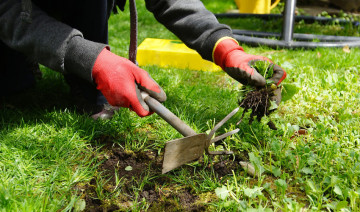
Weed Control Tips
Weeds are a common problem in gardens and lawns. They compete with desirable plants for nutrients, water, and sunlight, and can quickly take over if left unchecked. But with the right strategies and tools, you can control weeds and maintain a healthy, beautiful garden and lawn. Welcome to this blog where we will discuss efficient weed control techniques suitable for gardens and lawns.
Weed Control in the Garden
- Mulching: Mulching is a great way to control weeds in the garden. Cover the soil with a layer of organic mulch, such as wood chips, straw, or leaves, to suppress weed growth. Mulch also helps retain moisture in the soil and provides nutrients as it breaks down.
- Hand-pulling: Hand-pulling weeds is a time-tested and effective way to remove them from the garden. Be sure to pull the entire root system, as leaving even a small piece of the root can cause the weed to regrow.
- Hoeing: Hoeing is another effective way to control weeds in the garden. Use a hoe to chop off the weed stems just below the soil surface, which will prevent the weed from regrowing. Be careful not to disturb the soil too much, as this can bring up weed seeds from deeper in the soil.
- Weed barriers: Weed barriers, such as landscape fabric or plastic sheeting, can be laid down before planting to prevent weeds from growing. Cut holes in the fabric or sheeting where you want to plant, and cover with mulch to hide the barrier.
Weed Control in the Lawn
- Mowing: Regular mowing can help control weeds in the lawn by preventing them from going to seed. Keep your lawn mowed to the appropriate height for your grass type, and avoid cutting more than one-third of the grass blade at a time.
- Aeration: Aerating the lawn can help reduce weed growth by improving soil drainage and allowing air and nutrients to reach the grass roots. Rent an aerator or hire a professional to aerate your lawn.
- Fertilizing: Fertilizing your lawn can help it grow thicker and healthier, which can in turn help prevent weeds from taking hold. Use a fertilizer that is appropriate for your grass type and follow the instructions carefully.
- Herbicides: If all else fails, herbicides can be used to control weeds in the lawn. Choose an herbicide that is appropriate for your grass type and the types of weeds you are trying to control. Follow the instructions carefully, and be sure to apply the herbicide only to the affected areas.
Controlling weeds in the garden and lawn is an ongoing process that requires a combination of strategies and tools. By using a combination of mulching, hand-pulling, hoeing, weed barriers, mowing, aeration, fertilizing, and herbicides, you can keep weeds at bay and maintain a healthy and beautiful garden and lawn. So go ahead and get started on your weed control plan today!

